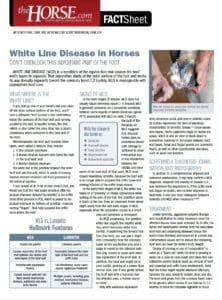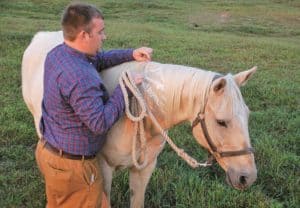Woman Dies After Exposure to Sick Horse
Cultures from both human and horse tested positive for S. equi spp zooepidemicus.

Cultures from both human and horse tested positive for S. equi spp zooepidemicus.

An extract from blue-green algae—a potentially toxic substance—could help arthritic horses without poisoning them.

Is it worth taking a chance on a horse with a “clubby” foot, and how can you manage one to keep him sound?

Injecting bone marrow aspirate into core SDFT lesions yielded good results for returning racehorses to competition.

This approach involves inserting a video endoscope into the epidural space to visualize potentially painful lesions.

Also known as “seedy toe,” white line disease is a serious hoof condition that requires vet and farrier intervention.

Few study horses with strangles showed the “classic” signs of disease, researchers determined.

Scientists are learning more about horses’ DNA and how mutations impact health, behavior, performance, and more.

One veterinarian offers some tips on an often overlooked but extremely important task: sheath cleaning.

A reproduction specialist reviews how she successfully managed and impregnated a particularly challenging problem mare.

Despite the growing body of research into senior horses’ health, their exact causes of death remain poorly documented.

Inflammatory airway disease and recurrent airway obstruction fall under the “equine asthma syndrome” umbrella.

Researchers recently described a novel and still experimental procedure designed to treat PPID with positive results.

Scientists found a gene that could identify superior tractability, or how easily a horse can be trained or controlled.

This is the first study to identify a potential genetic, rather than environmental, cause for foal loss in mares.

Soft tissue damage resulted in a larger increase in SAA levels than bone and joint injuries, researchers found.
Stay on top of the most recent Horse Health news with